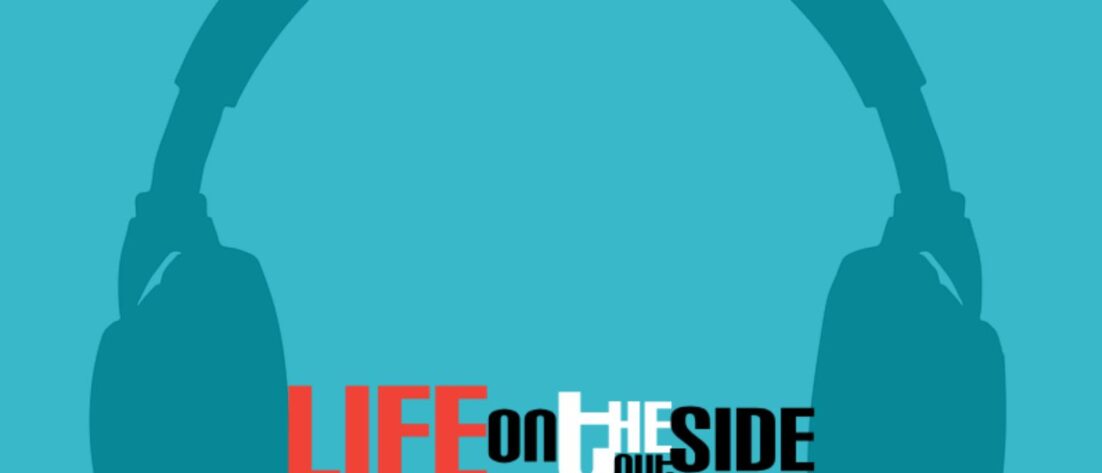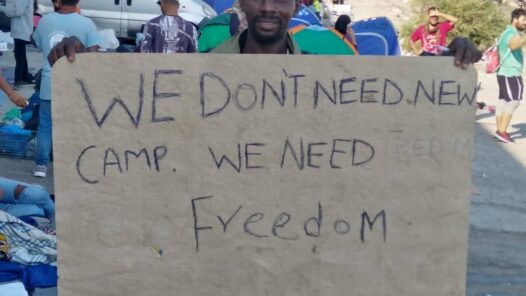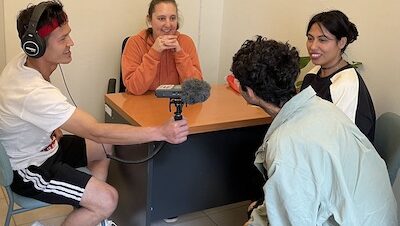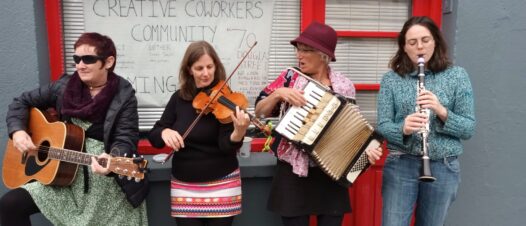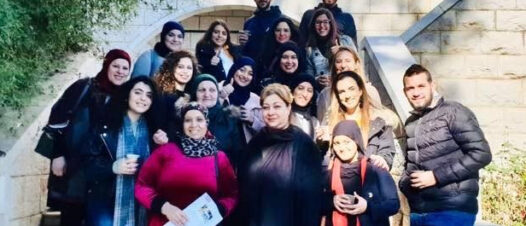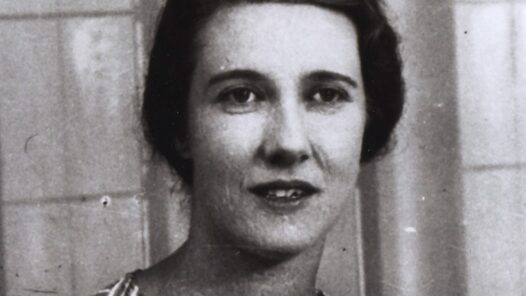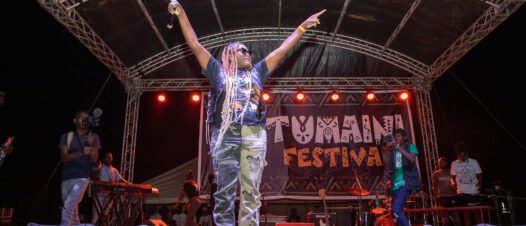‘features some profound conversations about life in and life after Ireland’s asylum system, and touches music, belonging, identity, racism, activism.’ – Right To Remain
Three women describe their experience of Direct Provision, seeking asylum in Ireland, the threat of deportation, what it means to be Irish, and how they deal with racism.
Elsie Nwaora, Nomaxabiso Maye and Florence Eriamantoe are three women who’ve survived Direct Provision; ‘a place of punishment’, as Elsie calls it.
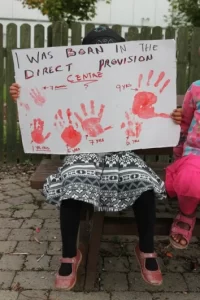
pic: 255 Entertainment
‘You can see it, but you don’t know what to do.’ – Elsie
Largely hidden away from Irish society, people seeking asylum often endure years in a system known as ‘Direct Provision’.
Elsie, Noma and Florence are three women who’ve struggled to survive in these institutions – and they reveal an intimate and honest account of their lives.
The lack of access to cooking facilities, the overcrowding (Florence lived in one room with her family for more than six years), the lack of privacy, and the strain this puts on family dynamics are all obvious: but perhaps what’s less tangible is the loss of dignity and self-direction.
‘You have no autonomy,’ – Noma
Tackling issues such as bringing up children under these conditions, racism in modern-day Ireland, deportation, migration and mental health – ‘Life On The Outside’ is an in-depth story of refuge in the ‘land of a hundred thousand welcomes.’
The three women share what it was like to navigate the asylum process in Ireland – and the challenges of adapting to life on the outside after years of institutional living in Direct Provision. They also discuss what being Irish means for their children -and how this new generation are defining themselves.
Thousands of people trying to survive the boredom and isolation, and the pervasive anxiety about papers. Bringing up children within an institution. Watching close friends and family members being deported. And then after years of this, attempting to adjust to ‘normal’ life, and navigating casual and not-so-casual racism. These are all things we discuss in ‘Life On The Outside’.
Elsie, Noma and Florence describe the myriad ways in which Direct Provision was so utterly soul-destroying for them, and the effect on their children of living there for so long. The sense of isolation and the effect on mental and physical health, of truly being on the outside of Irish life.
Music by Limbo Activist
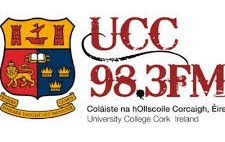
TRANSCRIPT:
INTRO Life On The Outside, produced by Bairbre Flood, funded by the Broadcasting Authority of Ireland, with the television licence fee.
ELSIE It was not easy. they make me to feel you know, to feel sad.
NOMA You have no autonomy over things.
FLORENCE It took almost everything from me… I still haven’t been able to get myself back because of the memories of stuff that happened in there.
MUSIC
BAIRBRE Elsie Nwaora, Nomaxabiso, and Florence Eriamantoe are three women who’ve been through Direct Provision.
INSERT FROM RECORDING OF PROTEST, SHOUTING ‘Amandla, Awethu!
BAIRBRE I first met Elsie in 2014. It was a time of the protests at the Kinsale Road Accommodation Centre, and was the first time I’ve heard of this thing called Direct Provision.
INSERT FROM PROTEST, MAN SPEAKING ‘…and people have to know that we exist.’
BAIRBRE People at the Centre had pulled couches out and had blocked the entrance.
Over ten days they organised amongst themselves to tell Irish people what was going on out there.
INSERT FROM PROTEST, THERESA SPEAKING ‘It’s time to wake up! It is right to say no to Direct Provision. it is right to say no to deportation. It is right now to say the children should not be damaged in their youth. It’s time to give these children back their life. Amandla!
CROWD AT PROTEST Awethu!
CLAPPING, MAN ON LOUDSPEAKER Amandla!
MUSIC
1.40
BAIRBRE Elsie now lives in Youghal, a small coastal town about an hour outside Cork City.
We look through some old photos when she’s been living in Kinsale Road, a.k.a. The Hostel.
ELSIE This is The Hostel, somebody was having a birthday here, here was the birthday, I think it was Theresa’s daughter… yeah… this one she’s deported from a long time ago-
BAIRBRE From Kinsale?
ELSIE No, she was in Millstreet, and she was six years in Ireland
BAIRBRE And why did they deport her?
ELSIE I don’t know, I don’t know, they just say her case is finished and she has to go. She have to leave the State. She even tried to run away you know. She run away and she was staying in Dublin and then trying to get work – to get a job there you know so that she can pay house rent, but she couldn’t make it, she couldn’t cope. Because it was not easy you know. She was six years here.
BAIRBRE Six years in Ireland?
ELSIE Yeah six years in Ireland.
It was really hard time for us you know, to be in Direct Provision. You are there but you’re not happy. You can be happy in the meantime when you have somebody – when you’re together there and maybe we’ll meet in the dining room, talking, you can be happy in that time, you are talking. But when you go back to your room…the sadness comes.
You can’t work, you can’t have a better education, you’re still waiting for your papers, you don’t know when they’re going to answer you, you’re just stuck there!
Yeah you’re just stuck.
You call your lawyer, you make appointment with him, and then you go and see your lawyer, then your lawyer tell you that it’s going to take time.
BAIRBRE How long did you live in Kinsale Road?
ELSIE It was seven years.
Direct Provision is a place of punishment. You can see it, but you don’t know what to do. You just stuck there. And seven years to stay waiting…Some seven, some eight years, some nine years, some ten years, some eleven years, some twelve years, you know, because our case is different.
We came here in Ireland with many different cases, many different issues. It’s not that we just leave our countries and want to come to Ireland – no, the issues, the issues make us to leave our countries.
SOUNDS FROM KITCHEN, ELSIE I’m doing this so we can have something – I didn’t put oil in to make it oily – I don’t like making it too oily all the time…
BAIRBRE When you came out did you have to get cookery lessons to remember how to cook again?
ELSIE When I get the house?
BAIRBRE Yes.
ELSIE Yes it takes me some days to know how to cooking yeah it was not easy you know… sometimes I cook and the food doesn’t even have taste [laughing] it has no taste, but we ate you know!
ELSIE FROM THE KITCHEN Do you like jazz?
BAIRBRE Yeah!
ELSIE OK South African jazz
MUSIC & SOUNDS FROM KITCHEN
ELSIE …He’s a Zulu yeah…
BAIRBRE Is that where you are from?
ELSIE No, no, me I am Ndebele! [laughing].
BAIRBRE Blank face here here [laughing] how many different languages are there in South Africa?
ELSIE 13…Not too bad [laughing], I suppose compared to other countries…
this is ready now…13 or 11 something like that…
BAIRBRE A lot anyway [laughing] is this ready now?
ELSIE Yeah
BAIRBRE We’d better be quiet and eat something…
ELSIE They didn’t allow us to cook.
They were cooking for us.
Then you eat there in the dining, and then you finish there, and then after that you have to go to your room.
MUSIC, CUTLERY, ROOM SOUNDS
ELSIE Yeah the day I got my papers it was a miracle! A Nigerian woman -you know in the Hostel we mixed together we don’t say this Nigerian, this South African, we just become like sisters because we are all African, we’re all black –
So she came in now by my window she’s knocking, knocking! I was sleeping it was early in the morning. I saw her knocking on my window and I thought ‘oh my god what? what is she looking for?’ She told me that I saw your envelope, I saw the registered post. ‘Where? In the reception?’ Yes.
Then I was like, is this the paper? Or is this what? I don’t know if it’s the deportation or the paper you know I was just like confused. I said ok, ok with my lawyer said I was gonna get papers… so then we went together from there and then I asked the reception to give me the registered post and they gave it to me and then I sign and I took it and I opened it. When I open it I said I just want to see where it’s written the Minister of Justice say it! You will stay in the state, I just want to read only that place only! [laughing] I don’t want to go far – just if I’m staying or if I’m not staying!
Oh my god, and then somebody has said oh my god with joy, and then another person – the person who came and knock on my door she grab my paper and she started reading it, and then I was just screaming, and people heard me screaming and they’re running and they said ‘what’s wrong?’ Oh my paper, and they started to rejoice with me.
It’s like everything – stress, emotional – it’s like they were wiped off from me.
The anger that I always had in my heart that anger was removed. Now I feel like I’m a person in Ireland [laughing] yeah it was a good story. This is the history, the history write it down for tomorrow, I will do it. I just want my daughter to know where she comes from, where her mum comes from – where we stay – it will be history for her – to know…not to forget.
BAIRBRE When you first got your papers and you were looking for somewhere to live did you find landlords where will you know when I’m going to rent to you because you’re from the centre?
ELSIE The landlord – this is my first landlord where I am – my landlord is a very good man. Yeah and I didn’t even have any problem with him, not even one day. I was like ‘oh my god how am I going to cope with him?’. I don’t know if maybe he like me, you understand? But he asked me ‘how long you’ve been in the Hostel?’ and I told him, and he was like ‘Oh my god. oh my god. Oh my god. it’s been long yeah, they kept you long.’
BAIRBRE Did Melissa find it strange not being in the centre or was there any time in the transition, trying to get used to things…that she missed the centre for instance?
ELSIE She still misses the centre.
BAIRBRE Still?
ELSIE Yeah. She do miss the centre. Me too, you know, I missed people. First the house was like you know I’m lonely you know it’s only me my daughter, sometimes I just start crying and think oh my god what is this now now [laughing] because now it’s only me and my daughter, and then her too, she missed her friends. She always say, ‘I don’t want to stay here, let’s go back to Hostel because I want to play with Michelle, I want to play with Kaina, I want to play with Amira, Precious… she would count all those friends. Then I said ‘no, no, no, don’t say that. we had to get the paper because we must have this paper because everybody is not going to stay there – it’s not just for temporal you know – even though they’re still there they’re going to come out.
BAIRBRE I suppose if you spent six years somewhere it’s going to be the normal…it’s gonna seem like the normal thing?
ELSIE [laughing] Yeah.
Maybe if she she didn’t spend six year there in the Hostel and she just grow up in the house, she would just see that it’s normal here, you know, it takes time for her to be settled. Even at school she didn’t like the school here, she wanted to go to school in Turners Cross where she’s always gone with the Hostel kids. ‘I always go to school with the bus’ she said. ‘I don’t like the school Mum, I don’t like this school, I don’t wanna stay here.’
Yeah that time when we just coming to the house it was too lonely, nobody I can talk to. People still be there white people you know what was their doors are closed due no [laughing] you see them maybe if you to go to the shop but you’re not serious as the person there it’s just quiet, lonely, no music, no nothing just me and Melissa. And you can see my child was bored, just me and her yeah. So that time when it was Friday I used to run away and go back to the Hostel still [laughing].
Yeah I did many time. I don’t know how many when I was Friday I go back to the Hostel… yeah one day one of them – she notice me – because sometimes I hide myself so they can’t see me because I know when they see me they’re going to chase us so I hide myself properly. So no one day one of the management notice, we see Elsie coming in, so we can’t see when she goes! So now she’s trying to find out is Elsie here or what…
She finds out yes I was there [laughing] and she called me ‘Elsie come, you know what? please please, please you got your paper, you’re no longer refugee, you understand? You and Melissa have to stay home!’ And I said to her I just came today.
And she said please Elsie, so I just told her ‘can you just let me to stay tonight only and then I’ll go?’ and she said ‘OK girl, you can sleep, then go tomorrow!’ Oh my god it’s not easy!
BAIRBRE I can understand that. Because you get used to things – so what you get used to…
ELSIE Yeah, when you get the paper it’s very good, it’s very happy, it makes you to feel happy and to feel strong now that you’re a winner – you made it at the end, you made it you know! So when it comes to looking for a house you struggle and at the end you get that house and you’d be happy that you have a house and have a place to stay and now have to move on. When you move on into a house you think everything is going to be easy – no there’s a lot of challenges you know.
BAIRBRE So what did you do when you got here you got on a course?
ELSIE Yes I challenge myself and started looking for a course so I can keep myself busy go to school and then I went for two years.
BAIRBRE What did you do?
ELSIE I did Health Care Level 4, and then second year Health Care Level 5. It’s what I like to do.
BAIRBRE With old people?
ELSIE It doesn’t matter. Anyway I can work, doesn’t matter as long as I can get a job and work.
18.09
MUSIC TRANSITION
BAIRBRE Noma has just handed in her thesis for her degree in social work in UCC.
We meet up at her apartment in Cork city centre where she lives with her son…
NOMA Initially I was in Dublin, yes in a reception centre in Dublin – which was a shock [laughing] it was much more like a detention centre! It was three months I was in it before I was dispersed. And when I was dispersed I was kind of looking forward to being dispersed as I was seeing it happening around me – people were talking about it and I was seeing other people being taken into other areas as well, and you would have thought – or at least I thought – it would have been better… that no matter where I’d be dispersed the conditions would be better. and…well that was another trauma again.
It’s a very old Castle. It looks beautiful from the outside, you know. It’s very hidden, very hidden away from the local community, you know, that separateness of people – this is the local community and this is the asylum seekers.
You actually lose your sleep in there and everything is turned upside down so I prefered to do things in the night and I used to do my laundry in the night, and I remember meeting the security guard just in the corridor and God I had the fright of my life! Yeah it is spooky.
I got into a habit of walking just for some exercise and to keep myself fit, physically and mentally. But no I hated it, I hated it.
It’s situated far away from the local community so it’s not a walkable distance from the Centre to the local shops – like the post office was everything say to the shop because we had no money to spend so it’s just to collect you know your nineteen euro, ten cents at the time.
The environment was quite hostile we always felt that we weren’t welcome-
BAIRBRE Would people say anything to you?
NOMA No they wouldn’t really say anything, but- but just that separateness… this just it them and us as we all lived in the same town and you’d expect the people would get talking to you and ask you questions but no, very rarely you’d see people interacting with the Drishane residents.
For some reason because I was walking, I got talking to people during my walks – and I got used to one lady in the evenings so we got talking…when the owner noticed that I was getting close to this lady she texted me and said that she been written to that she was no longer allowed in Drishane premises – yeah the woman that I befriended! Yes that I had met during the walks…
Yeah you see one of the things about Direct Provision centres, some of them are privately owned and that one was privately owned and the owner stayed in the town. The family who owned that Centre – Drishane Castle were given the tendership from the government and that alone creates a bit of …what can I say? A bit of unease, with the locals as well…
BAIRBRE The locals are resentful?
NOMA Yes the locals are resentful of the owner himself and then we get involved in the dispute.
Direct Provision centres have become a political issue in Irish communities because people don’t usually understand how this whole system is set up.They see people coming into their towns, sponging on the resources, but what they are failing to understand is that we are not given any opportunities to look after ourselves – to work basically – and we’re seen as the scroungers of the state and taxpayers money… whereas if people were allowed to work it wouldn’t be the case.
Even allowed to study, because when you are allowed to study or further yourself up-skilling yourself and empowering yourself to get better chances in life.
BAIRBRE And there’s a lot of supervision? Did you feel that? I noticed in Kinsale Road a lot of cameras everywhere…
NOMA There’s a lot of cameras everywhere and there’s always been an issue with child protection in these centres – and I mean you cannot put large group of people all together and with children and no facilities… I know they’ll say oh there’s a playroom – but it’s just a bare playroom there’s nothing! There never used to be anything in Drishane, not even toys…I started the Scrabble with the older kids because of the way they were so bored.
BAIRBRE Just being cut off from the wider community must have long-term effects on kids? You know, if you’re separated from the people you’re going to be living with…
NOMA Of course. Children have sleepovers, you know like, they have play dates, they do all sorts of things. My son now he does swimming lessons with a few boys in his class – there was no way I could have afforded to do that when I was in Direct Provision – no way – and there are lots of parents who wished so their children could participate in extracurricular activities just to build their children’s self-esteem…
BAIRBRE If you don’t meet someone down in the pub or meet someone through the school or work, it’s hard for Irish people to get to know-
NOMA You see that is where the trick is! Now you’re saying that people meet in work, college but if you allow people who are in Direct Provision centres to participate in those things – college, work, you know – then you’re allowing people to get to know each other.
I met a lot of friends through college. Had it been that I was in the Direct Provision centre sitting there, there’s no way, there’s no way.
I can understand you saying takes a lot of energy to go to centres to get to know people and people are also very suspicious as well – I would be suspicious if a white person came into the centre wanting to know things – I wouldn’t give out anything, but as we get to know each other through college, through participation…
When I was in the centre I did a childcare course and at the end of the class of college someone would say ah which way are you heading can I give you a lift? I’ll drop you to the train station, I’ll drop you that way… and you get talking to people… then I get to know people…then if you segregate people. That segregation of you know, ‘you stay there’, ‘you stay there’, and there’s no way of interacting.
BAIRBRE For some reason you forced yourself to go out and do things…but a lot of people… they suffer from a lot of depression in Direct Provision…
NOMA Yes of course. I went through it myself. I’m not gonna tell you anything otherwise, that I didn’t experience it myself.
The first thing they reacted was my mental health – and I didn’t see it happening. It was just little things… so I can’t sleep, and my appetite, this and that… And this is what the government is failing to understand because it’s costing the state more to keep people that way…If you’re in Direct Provision you’re constantly at the GP because of the stress pattern, you know, everyone having to go through this because you’re all so traumatised. You come into this huge old castle in the middle of nowhere, when you look around and see people, they tell you they’ve been here for three – four – five years and you begin realising that you’re also in this mess yourself and how you’re going to get out of it – you’ve no solution to it…so I went through this myself.
I suppose for me I was lucky because I had my little walks – these helped a lot just to reflect on things.
I started blaming myself, feeling like a failure ending in a place like this, but you know, I started walking… exercise and I got on the course in Marlow that give me a reason to look forward to the following week, you know, life is going on…
But somebody else didn’t have those opportunity that I had and people just fell into depression, they fell deep into depression.
I mean I could tell you horrible, horrible stories, and people with young children and they just fall into depression.Most of them would lose their children to social services because they couldn’t look after them – and basically they couldn’t look after their children because they were depressed. So the results be losing your child.
And people are falling ill, getting sick, because of the wear and tear on the body being overly stressed… because time you know it’s very important. You cannot keep somebody in the asylum system for like – five years is a long time – even three years is a long time in somebody’s life. It’s not just a number – every second counts because this is a person, this is a human life.
BAIRBRE You want to do social work obviously…
NOMA Yes I want to do social work, I do want to work with migrants a lot because I understand what people come from. People come with various challenges from various backgrounds…
BAIRBRE Do you see things in Irish culture that are specific to Irish culture – what is it?
NOMA I wouldn’t say there are things that are specifically one can identify as Irish, but in my opinion it depends on how active a person is. I live in Ireland now and I’ve been living here for past nine years and I regard myself as an active citizen, so in my activism I identify myself as Irish because the issues that I’m more interested in are Irish issues – that makes me Irish. And these are issues that are happening here in Ireland that affect me here in Ireland so I’m responding and reacting to those issues – that makes me Irish. Most of us come here not knowing your history of Ireland we haven’t a clue and you only get to familiarise yourself when you’re here – even with Irish music, you know, you listen to music you feel that oh God I can actually relate…Irish music I’m talking about, and I’ve lost all sense of South African music [laughing] at this point.
BAIRBRE Oh no! Don’t do that [laughing]
NOMA It comes in a while… sometimes it comes, yeah Irish music…
SHORT MUSIC TRANSITION
BAIRBRE Florence has also spent years in Drishane Castle…
FLORENCE It took almost everything from me like even up till now that I’ve left Direct Provision I still haven’t been able to get myself back because of memories stuff that happened in there. You won’t be able to do anything. I and my kids were sleeping on just one bed for three years, you know the mental torture and everything is just too horrible and it’s even difficult for me to move on.
We had a bus that would come three times a week to Cork city, you had to sign up for one day to go on the weekend if you miss that day you must wait until the next week so we just locked up in there – more or less like something that is higher than a prison – then it was that..
BAIRBRE Did you have any interaction with people living around?
FLORENCE No that community didn’t give us the opportunity to integrate with them – even in the school their kids wouldn’t play with our kids, like you take your kids to school none of the parents would have any conversation with you…we were just on our own, we didn’t have friends around that were Irish people…none of them – it was that bad.
Sometimes you’re in your room they come in to search your bags stuff like that, you’re not allowed to cook your own food we had to hide. Sometimes you just make something for your kids and they come all the way to seize your slow cooker.
BAIRBRE What about the threat of deportation as well?
FLORENCE It was horrible, you know like, I had a deportation order since 2009. When they’re coming into the Hostel to arrest one person about 14 immigration officers – it was horrible. It was horrible. The fact that I had a deportation order you know made me scared and all that you know. For a while I was on depression medication, you know, for a very long time – then I told myself I had to get at the depression because I didn’t want to continue with the medication. You know it was that bad. I was scared, sometimes when you’re in your room the manager will come to tell you that you had a visitor only for them to come here as immigration officer.
And the way they dealt with them you know, they won’t allow them to take anything – sometimes they just put a few clothes in a bin bag and that’s all they go home with.
You know it was really scary for adults and for the kids as well because they knew exactly what was going on.
BAIRBRE Would they come in at night?
FLORENCE Yes most times they will come at night – maybe around 1 a.m. in the morning – 1 to 5 a.m. that’s when they will come. They would have their cars, staff members surrounding the buildings for the fact that they didn’t want anyone to escape, and yeah you know, it was scary…
BAIRBRE Would your kids hear any of this going on?
FLORENCE Oh definitely. Because once it’s happening almost everyone starts knocking on the doors ‘they’re here!’
We had one woman we had to hide in the wardrobe with her kids, I’ve never seen anything like that – the kids are the kind of kids that are very active – for the first time in my life I saw kids that were quiet…you know that… [crying]
I’m sorry Bairbre…
And the kids were scared throughout, they’re hiding in the cupboard until they were gone.
You know that’s when it dawns on me, you know, the kids know everything that is happening…it was horrible, you know, it was… [sighs]
BAIRBRE And eventually they gave you your papers?
FLORENCE Yeah, in 2013…yes after a very long time, I got my…yeah…
BAIRBRE But your husband was sent back?
FLORENCE Yes my husband was deported July 15th 2010.
I wasn’t sent back because they said my kids case was still in the High Court and until that’s decided I wouldn’t be able to leave the country, so I’ve been on my own. Even though I have my residency there’s no family reunification when you’re deported – because he has been deported. we have to go through so many processes to be allowed to come back – they’ve destroyed so many families. I know maybe 10 to 15 women whose husbands were deported and their family has been destroyed. Some of them their kids don’t have any relationship with their dad.
Things they wouldn’t do to their own families, you know, they’re talking about the rights of kids – kids do have rights, but when it comes to asylum seekers and people from other countries that doesn’t apply at all. Kids from Africa, kids from Direct Provision, don’t have the right to be living with both parents according to the Irish justice system…so…
BAIRBRE What do you think could be done?
FLORENCE I don’t know, I just feel that splitting families is not what you have…I just think these people should be able to live freely, you know, whether they feel like they want to live as far as they don’t constitute a nuisance to that community. People should be allowed to live where they want to live because we have loads of Irish people, Americans, in my country. We treat them like we’re all one, but when we come here it’s too difficult for us to be accepted…I really don’t know why it’s like that.
BAIRBRE Your kids are going to school here now yeah?
FLORENCE Yeah.
BAIRBRE And do people treat your kids differently now that they know you’re just living in the community, rather than the Direct Provision Centre?
FLORENCE Yeah I think when we moved in to Ballincollig we had issues with the principle of my son’s school because he’s the only black child in that class. It was a tough one – if anything happened he said he was the one that did it, and they were upset with them, but I stood up for myself I read a book about how black kids and Afro-Americans are being treated in the UK so after going through that book I stood up for myself, and I said I’d fight this fight so I can’t just let them bully my kids like that. So I went into the school and I had a fight with the principal, and they said they needed to call the psychologist.
They called in a psychologist and he said it was nothing wrong with my son, but that he is bored in the class because he knew more than what he was being taught. The good thing about it was that he’s now a student of UCC centre for talented youth – that was the outcome for that and since that incident the principal never said anything. The only thing she said ‘now is your son is a very good boy’. So I told her ‘is it because my son is the only black child in that class that you guys are…?’ because other black women were telling me the same story of how their kids have been treated in school – so I told her if it continues we’re going to stage a protest in your school if you don’t want people to know what you are doing here – so since then I have not any issues…so yeah-
BAIRBRE Your son has high IQ?
FLORENCE Yeah the pass mark was 95 to 105, but he scored 135. So he was referred to the centre for talented youth, yeah, so he’s actually doing a course in there, in UCC-
BAIRBRE What’s his interest in? What kind of field?
FLORENCE At the moment he’s doing astronomy and experimental science – from 30th January he will be studying veterinary and animation…
Like, I graduated as a banking and finance student back home, but the situation made me come to this country – that doesn’t mean that I would come here to become what I’m not! Like you know, but they just don’t give us the opportunity to prove ourselves, you know, so yeah…
BAIRBRE Do you think that’s just a general fear or do you think it’s a deep-seated racism?
FLORENCE Yeah to me like, I use the one that happened in my son’s school and what was going on in Direct Provision where was living – I would say it’s racism. While we were in Drishane Castle she always said to us ‘you people are from a very poor country – you’re like monkeys you live in the trees’ all that you know-
BAIRBRE She said that?
FLORENCE Yes that’s what she always say ’you guys live on a tree’, stuff like that, so I would think its racism, you know yeah, that’s what I would think anyway…yeah.
In this age and time it’s horrible you know it’s really horrible. A husband and a wife with four kids, three kids, will be living in one room – how could that be? And I remember when I came in here to Ballincollig, the Social Welfare came here and said ‘I have to check your house to see if it’s ideal for the kids’, and she said, ‘how many bedrooms there are? No I don’t think it’s acceptable.’ I said, ‘Why? But we were living in one room for more than 6 years!’ ‘Oh yeah well that is Direct Provision, this is you know…’ I said to her what is the difference between Direct Provision? Between the kids? What is the difference between the kids – they’re still the same children so if you can tell me the difference…
She couldn’t say anything.
44.35
NOMA If you were to tell me actually that there is no racism in Ireland I would strongly disagree with you, because there is, there is. It comes in different forms – it’s institutional, it’s found in schools and education, it’s found in workplaces… so it is there.
People ask me a lot about my experience in Direct Provision – ask me about my experience post- Direct Provision and I will tell you that I’ve only had just one job. One paying job. Not because I didn’t want to work, because I couldn’t find any, not because I wasn’t looking – because my name’s Nomaxabiso! It’s the same with housing, before the homelessness crisis you know if you’re looking for a house as an African person it’s very difficult. A lot of people will tell you this – that they prefer to live in other areas where your skin colour is overlooked – areas like Dublin. A lot of people I know go to work in Dublin, but I don’t want to leave Cork I’ve been here for almost 9 years now and this area so-
BAIRBRE Do you get any hassle on the street. or did you?
NOMA It’s been awhile now but yeah I used to. I used to. You know, told straight to your face go back to your country.
So it happened again just last year before August, sitting in McDonald’s and the person who was sitting next to us she shouted… there was about four or five of us and just one person from nowhere just from nowhere started calling us blackies, go back to your country-
BAIRBRE Blackies?! Do people say that?
NOMA Yeah. [laughing] yeah they do, I’m afraid.
You know in my observation when I looked at this person I kind of felt sorry for them in a way, that you could see that there were other underlying issues with them. I wouldn’t known what it was, but you could see that there was other issues with them.
I sort of challenged her. I said look there’s a camera over there laughing just from nowhere you just started swearing at us – there’s a camera over there and we could take that to the guards and that’s evidence the camera is recording. And I was pointing and you know when she realised there was a camera she was still going on but at a very low laughing lowered her voice, but still swearing at us.
We left her there but we were still laughing and I was telling the other girls these issues are quite common and I was telling them that you know this happens quite often out here and you know it yourselves but I’d like to instill this though – do not tolerate it! You must always challenge it, you know people should go forward. And at the moment people feel you’re going to report acts of racism that nothing’s being done about it, but I think the more people report them – something will be done about it at some point.
48.43
FLORENCE Yeah you know I live here now, I have to get used to it. The majority of them are nice people you know while some… like this one in the shopping centre, the last time, he was holding his phone he just came close to me and he said ‘Oh yeah all these African who are coming here to take our dole’, and he just walked past…
Some of them are nice and some of them are nasty, some of them say ‘go back to your own country’ you know, so, well…
Some of them are nice people while some are still nasty you know.
Especially the fact that we have kids being born in here I think they should find a way to accept this fact – that they are more or less Irish. There should be no discrimination because once there’s no discrimination everybody will be accepted as one.
ELSIE Oh Melissa! She loves to be Irish – she doesn’t even want to be South African you know! She thinks that if you’re South African you are black…I don’t know… she doesn’t even want to know! If I said to her, ‘Melissa, where are you come from Melissa?’ and she says to me ‘I’m from Dublin’, because she’s born in Dublin – when I say ok you’re from Dublin [laughing]
I say ok cause you’re born in Dublin? She says yes, and then I said ‘are you African in Dublin?’ and she says, ‘No Mum, I’m not African! I’m Irish.’ [laughing] I said ‘you and your mum are brown you know so here you are, African Irish.’ And she says ‘mum you better leave it because you don’t understand I told you that I’m Irish.’
50.46
NOMA Oh, he says he’s Irish yeah! He presents himself as Irish, which is interesting because you people would look at him and think he’s African, but in his world he’s Irish – he’s never been anywhere else. He’s never known any other life, he’s only known Ireland. He’s never even met my family back in South Africa, because he’s always been here this is the only life he knows…
The rents are rising and they’re rising faster than they were during the previous boom, but what I want to say is that it’s not the asylum-seekers themselves which are so much of a threat when it comes to housing. The State needs to build more houses for people because they’ve not been building social housing. I’ve heard this a number of times people saying that we need to be taking care of our own – of their own – but these are two separate issues. There is approximately 5,000 people in Direct Provision centres and the money that is being spent in these Direct Provision centres by the government through private ownership that is the money that could be used to build more housing.So these are two separate issues, but the asylum seekers tend to be…tend to be scapegoated.
MUSIC – song, ‘Limbo’ by Activist, ft. Lucky Khambule
52.50
ELSIE The way it is, a lot of people didn’t know there was people living there, you know that that place there is the Hostel – that it’s Direct Provision they didn’t know about it. when we are in the boss the Refugee bus going to the city when the bus is coming out you see the Irish people in their cars those who are driving they’re like Surprise looking, you know they’re always wondering what is it happening in there?
EXCERPT from ‘Limbo’ with Lucky Khambule speaking‘You can’t take away the dignity of a person – when the dignity is taken away from you, you’ll not be able to influence anybody else that is around you. Direct Provision takes that away from you.’
MUSIC
ELSIE I think it will change, it will change. Because you can’t remain in the same place forever you know? Nothing remain in the same place forever! Yes! [laughing]
BAIRBRE Thank you to Elsie Nwaora, Nomaxabiso and Florence Eriamantoe for talking to me about a time in their lives which is so painful to remember.
There are just over 5,500 people including 1,500 children still living in 34 Direct Provision centres all across Ireland.
‘Life On The Outside’, produced by Bairbre Flood. Funded by the Broadcasting Authority of Ireland with the television licence fee.
MUSIC
